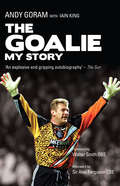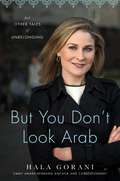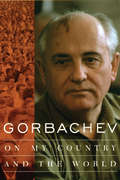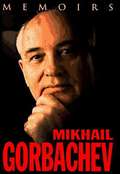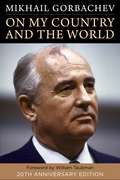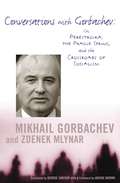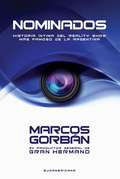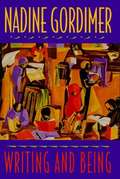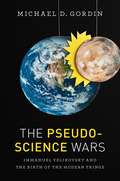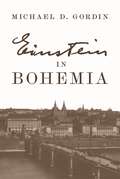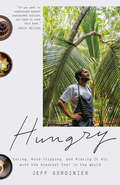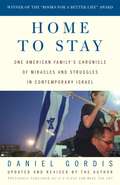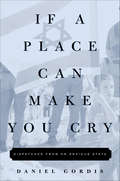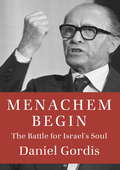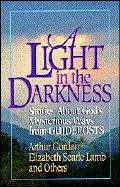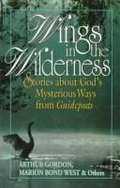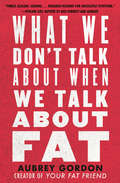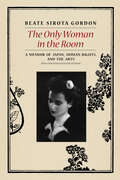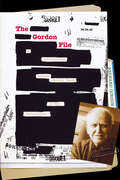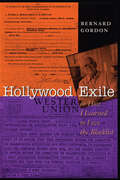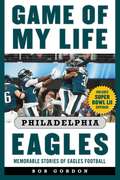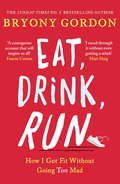- Table View
- List View
The Goalie: My Story
by Andy Goram Iain KingThis is the story of a genius with flaws. Lots of them. On the field, Andy Goram was a defiant figure between the sticks who, in many ways, defined the history-making nine-in-a-row team that brought so much success to Ibrox; off it, he careered through three divorces and a welter of lurid tabloid headlines sensationalising his hellraising antics.In this no-holds-barred account, Goram lifts the lid on his tempestuous life in football, from the Gers' glory days to a fairy-tale chapter with his boyhood heroes: Manchester United. His life in the Old Firm is examined in depth, from the saves that broke former Celtic manager Tommy Burns's heart to a story that was buried until now: Celtic's astonishing bid to sign him.Goram's Scotland career ended in bitterness when he walked out on the squad before France 98, and here he smashes the myths that have always surrounded his relationships with Craig Brown and Jim Leighton.This is the inside story of the man the fans voted Rangers' greatest-ever goalkeeper. He remains a genius with flaws: a legend simply known as The Goalie.
But You Don't Look Arab: And Other Tales of Unbelonging
by Hala GoraniEmmy Award-winning international journalist Hala Gorani weaves stories from her time as a globe-trotting correspondent and anchor with her own lifelong search for identity as the daughter of Syrian immigrants. What is it like to have no clear identity in a world full of labels? How can people find a sense of belonging when they have never felt part of a &“tribe?&” And how does a blonde-haired, blue-eyed woman who&’s never lived in the Middle East honor her Arab Muslim ancestry and displaced family—a family forced to scatter when their home country was torn apart by war? Hala Gorani&’s path to self-discovery started the moment she could understand that she was &“other&” wherever she found herself to be. Born of Syrian parents in America and raised mainly in France, she didn&’t feel at home in Aleppo, Seattle, Paris, or London. She is a citizen of everywhere and nowhere. And like many journalists who&’ve covered wars and conflicts, she felt most at home on the ground reporting and in front of the camera. As a journalist, Gorani has traveled to some of the most dangerous places in the world, covering the Arab Spring in Cairo and the Syrian civil war, reporting on suicide bombers in Beirut and the chemical attacks in Damascus, watching the growth of ISIS and the war in Iraq—sometimes escaping with her life by a hair. But through it all, she came to understand that finding herself meant not only looking inward, but tracing a long family history of uprooted ancestors. From the courts of Ottoman Empire sultans through the stories of the citizens from her home country and other places torn apart by unrest, But You Don&’t Look Arab combines Gorani&’s family history with rigorous reporting, explaining—and most importantly, humanizing—the constant upheavals in the Middle East over the last century.
Gorbachev: On My Country and the World
by Mikhail GorbachevHere is the whole sweep of the Soviet experiment and experience as told by its last steward. Drawing on his own experience, rich archival material, and a keen sense of history and politics, Mikhail Gorbachev speaks his mind on a range of subjects concerning Russia's past, present, and future place in the world. Here is Gorbachev on the October Revolution, Gorbachev on the Cold War, and Gorbachev on key figures such as Lenin, Stalin, and Yeltsin. The book begins with a look back at 1917. While noting that tsarist Russia was not as backward as it is often portrayed, Gorbachev argues that the Bolshevik Revolution was inevitable and that it did much to modernize Russia. He strongly argues that the Soviet Union had a positive influence on social policy in the West, while maintaining that the development of socialism was cut short by Stalinist totalitarianism. In the next section, Gorbachev considers the fall of the USSR. What were the goals of perestroika? How did such a vast superpower disintegrate so quickly? From the awakening of ethnic tensions, to the inability of democrats to unite, to his own attempts to reform but preserve the union, Gorbachev retraces those fateful days and explains the origins of Russia's present crisis. But Gorbachev does not just train his critical eye on the past. He lays out a blueprint for where Russia needs to go in the next century, suggesting ways to strengthen the federation and achieve meaningful economic and political reforms. In the final section of the book, Gorbachev examines the "new thinking" in foreign policy that helped to end the Cold War and shows how such approaches could help resolve a range of current crises, including NATO expansion, the role of the UN, the fate of nuclear weapons, and environmental problems.Gorbachev: On My Country and the World reveals the unique vision of a man who was a powerful actor on the world stage and remains a keen observer of Russia's experience in the twentieth century.
Gorbachev: On My Country and the World
by Mikhail GorbachevThe last president of the Soviet Union discusses Communism, the Cold War, and bringing democracy to Russia in this sweeping political memoir. Drawing on his own experience and rich archival material, Mikhail Gorbachev shares his illuminating perspective on Russia's past, present, and future place in the world. Beginning with the October Revolution of 1917, he notes how much Vladimir Lenin and the Bolshevik Party did to modernize Russia. While he argues that the Soviet Union had a positive influence on social policy in the West, Gorbachev maintains that this positive development was cut short by Stalinist totalitarianism. Discussing the fall of the USSR in depth, Gorbachev examines the goals of perestroika, awakening ethnic tensions, the inability of democrats to unite, and his own attempts to preserve the union through reform. In retracing those fateful days, he explains the origins of Russia's present crisis. He then lays out a blueprint for Russia&’s future, charting a path toward meaningful economic and political reforms. He also presents possible resolutions to a number of international dilemmas, including NATO expansion, the role of the UN, the fate of nuclear weapons, and environmental problems
Memoirs
by Mikhail GorbachevIn these long-awaited memoirs, Mikhail Gorbachev looks back on a lifetime that mirrors the fate of the Russian people. From the persecution of his family under Stalin to his first political steps, to his extraordinary rise within the Communist Party, Gorbachev recounts the events that led to his own disillusionment, without which the eventual implosion of communism would not have taken place. He casts an equally sharp eye on the policies of both past communist governments and present-day reformers.
On My Country and the World: On My Country And The World
by Mikhail GorbachevHere is the whole sweep of the Soviet experiment and experience as told by its last steward. Drawing on his own experience, rich archival material, and a keen sense of history and politics, Mikhail Gorbachev speaks his mind on a range of subjects concerning Russia's past, present, and future place in the world. Here is Gorbachev on the October Revolution, Gorbachev on the Cold War, and Gorbachev on key figures such as Lenin, Stalin, and Yeltsin. The book begins with a look back at 1917. While noting that tsarist Russia was not as backward as it is often portrayed, Gorbachev argues that the Bolshevik Revolution was inevitable and that it did much to modernize Russia. He strongly argues that the Soviet Union had a positive influence on social policy in the West, while maintaining that the development of socialism was cut short by Stalinist totalitarianism. In the next section, Gorbachev considers the fall of the USSR. What were the goals of perestroika? How did such a vast superpower disintegrate so quickly? From the awakening of ethnic tensions, to the inability of democrats to unite, to his own attempts to reform but preserve the union, Gorbachev retraces those fateful days and explains the origins of Russia's present crises. But Gorbachev does not just train his critical eye on the past. He lays out a blueprint for where Russia needs to go in the twenty-first century, suggesting ways to strengthen the federation and achieve meaningful economic and political reforms. In the final section of the book, Gorbachev examines the "new thinking" in foreign policy that helped to end the Cold War and shows how such approaches could help resolve a range of crises, including NATO expansion, the role of the UN, the fate of nuclear weapons, and environmental problems. On My Country and the World reveals the unique vision of a man who was a powerful actor on the world stage and remains a keen observer of Russia's experience in the twentieth century.This anniversary edition features a new foreword by William Taubman, award-winning biographer of Khrushchev and Gorbachev.
Conversations with Gorbachev: On Perestroika, the Prague Spring, and the Crossroads of Socialism
by Mikhail Gorbachev Zdenek MlynarMikhail Gorbachev and Zdenek Mlynar were friends for half a century, since they first crossed paths as students in 1950. Although one was a Russian and the other a Czech, they were both ardent supporters of communism and socialism. One took part in laying the groundwork for and carrying out the Prague spring; the other opened a new political era in Soviet world politics.In 1993 they decided that their conversations might be of interest to others and so they began to tape-record them. This book is the product of that "thinking out loud” process. It is an absorbing record of two friends trying to explain to one another their views on the problems and events that determined their destinies. From reminiscences of their starry-eyed university days to reflections on the use of force to "save socialism” to contemplation of the end of the cold war, here is a far more candid picture of Gorbachev than we have ever seen before.
Conversations with Gorbachev: On Perestroika, the Prague Spring, and the Crossroads of Socialism
by Mikhail Gorbachev Zdenek Mlynar George ShriverMikhail Gorbachev and Zdenek Mlynar were friends for half a century, since they first crossed paths as students in 1950. In 1993 they decided that their conversations might be of interest to others and so they began to tape-record them. From reminiscences of their starry-eyed university days to reflections on the use of force to "save socialism" to contemplation of the end of the cold war, here is a far more candid picture of Gorbachev than we have ever seen before.
NOMINADOS (EBOOK)
by Marcos GorbanGran Hermano es el reality show más importante del mundo. El de mayores audiencias, el de mayor facturación, el que más fantasías despierta. Los drogan? Les dan alcohol para que tengan sexo? Está todo arreglado? Por qué están tomando sol todo el día sin hacer nada? Están guionados? Los mitos que se tejieron alrededor del programa son muchos. Y han ido cambiando a través de los años. Pero hay muchas historias que el público y la prensa desconocen. Cuál fue la trastienda de los castings, de las galas en vivo, de las decisiones que más impacto tuvieron, desde la confesión de homosexualidad de Gastón hasta la inclusión de un ex presidiario en 2007?
Writing and Being
by Nadine GordimerWhether talking about her own writing, interpreting the works of others, or giving us a window on the world that "we in South Africa are attempting to reconstruct," Nadine Gordimer has much to tell us about the art of fiction and the art of life. In this deeply resonant book Gordimer examines the tension for a writer between life's experiences and narrative creations. She asks first, where do characters come from--to what extent are they drawn from real life? We are touching on this question whenever we insist on the facts behind the fiction, Gordimer suggests, and here she tries to unravel the mysterious process that breathes "real" life into fiction. Exploring the writings of revolutionaries in South Africa, she shows how their struggle is contrastingly expressed in factual accounts and in lyrical poetry. Gordimer next turns to three writers linked by their search for a life that transcends their own time and place: in distinctive and telling ways, Naguib Mahfouz, Chinua Achebe, and Amos Oz defy accepted norms of loyalty to the mores and politics of their countries. Their search in Egypt, Nigeria, and Israel for a meaningful definition of home testifies to what it must be: the destination of the human spirit beyond national boundaries. Ending on a personal note, Gordimer reveals her own experience of "writing her way out of" the confines of a dying colonialism.
The Pseudoscience Wars: Immanuel Velikovsky and the Birth of the Modern Fringe
by Michael D. GordinProperly analyzed, the collective mythological and religious writings of humanity reveal that around 1500 BC, a comet swept perilously close to Earth, triggering widespread natural disasters and threatening the destruction of all life before settling into solar orbit as Venus, our nearest planetary neighbor. Sound implausible? Well, from 1950 until the late 1970s, a huge number of people begged to differ, as they devoured Immanuel Velikovsky's major best-seller, Worlds in Collision, insisting that perhaps this polymathic thinker held the key to a new science and a new history. Scientists, on the other hand, assaulted Velikovsky's book, his followers, and his press mercilessly from the get-go. In The Pseudoscience Wars, Michael D. Gordin resurrects the largely forgotten figure of Velikovsky and uses his strange career and surprisingly influential writings to explore the changing definitions of the line that separates legitimate scientific inquiry from what is deemed bunk, and to show how vital this question remains to us today. Drawing on a wealth of previously unpublished material from Velikovsky's personal archives, Gordin presents a behind-the-scenes history of the writer's career, from his initial burst of success through his growing influence on the counterculture, heated public battles with such luminaries as Carl Sagan, and eventual eclipse. Along the way, he offers fascinating glimpses into the histories and effects of other fringe doctrines, including creationism, Lysenkoism, parapsychology, and more--all of which have surprising connections to Velikovsky's theories. Science today is hardly universally secure, and scientists seem themselves beset by critics, denialists, and those they label "pseudoscientists"--as seen all too clearly in battles over evolution and climate change. The Pseudoscience Wars simultaneously reveals the surprising Cold War roots of our contemporary dilemma and points readers to a different approach to drawing the line between knowledge and nonsense.
Einstein in Bohemia
by Professor Michael D. GordinA finely drawn portrait of Einstein's sixteen months in PragueIn the spring of 1911, Albert Einstein moved with his wife and two sons to Prague, the capital of Bohemia, where he accepted a post as a professor of theoretical physics. Though he intended to make Prague his home, he lived there for just sixteen months, an interlude that his biographies typically dismiss as a brief and inconsequential episode. Einstein in Bohemia is a spellbinding portrait of the city that touched Einstein's life in unexpected ways—and of the gifted young scientist who left his mark on the science, literature, and politics of Prague.Michael Gordin's narrative is a masterfully crafted account of a person encountering a particular place at a specific moment in time. Despite being heir to almost a millennium of history, Einstein's Prague was a relatively marginal city within the sprawling Austro-Hungarian Empire. Yet Prague, its history, and its multifaceted culture changed the trajectories of Einstein's personal and scientific life. It was here that his marriage unraveled, where he first began thinking seriously about his Jewish identity, and where he embarked on the project of general relativity. Prague was also where he formed lasting friendships with novelist Max Brod, Zionist intellectual Hugo Bergmann, physicist Philipp Frank, and other important figures.Einstein in Bohemia sheds light on this transformative period of Einstein's life and career, and brings vividly to life a beguiling city in the last years of the Austro-Hungarian Empire.
Hungry: Eating, Road-Tripping, and Risking It All with the Greatest Chef in the World
by Jeff GordinierA food critic chronicles four years spent traveling with René Redzepi, the renowned chef of Noma, in search of the most tantalizing flavors the world has to offer. <P><P> Hungry is a book about not only the hunger for food, but for risk, for reinvention, for creative breakthroughs, and for connection. Feeling stuck in his work and home life, writer Jeff Gordinier happened into a fateful meeting with Danish chef René Redzepi, whose restaurant, Noma, has been called the best in the world. A restless perfectionist, Redzepi was at the top of his game but was looking to tear it all down, to shutter his restaurant and set out for new places, flavors, and recipes. This is the story of the subsequent four years of globe-trotting culinary adventure, with Gordinier joining Redzepi as his Sancho Panza. In the jungle of the Yucatán peninsula, Redzepi and his comrades go off-road in search of the perfect taco. In Sydney, they forage for sea rocket and sandpaper figs in suburban parks and on surf-lashed beaches. On a boat in the Arctic Circle, a lone fisherman guides them to what may or may not be his secret cache of the world’s finest sea urchins. And back in Copenhagen, the quiet canal-lined city where Redzepi started it all, he plans the resurrection of his restaurant on the unlikely site of a garbage-filled lot. Along the way, readers meet Redzepi’s merry band of friends and collaborators, including acclaimed chefs such as Danny Bowien, Kylie Kwong, Rosio Sánchez, David Chang, and Enrique Olvera. <P><P> Hungry is a memoir, a travelogue, a portrait of a chef, and a chronicle of the moment when daredevil cooking became the most exciting and groundbreaking form of artistry.
Home To Stay: One American Family's Chronicle of Miracles and Struggles in Contemporary Israel
by Daniel GordisIn the summer of 1998, Daniel Gordis and his family moved to Israel from Los Angeles. They planned to be there for a year, but a few months into their stay, Gordis and his wife decided to remain in Jerusalem permanently, confident that their children would be among the first generation of Israelis to grow up in peace. Immediately after arriving in Israel, Daniel had started sending out e-mails about his life to friends and family abroad. These missives—passionate, thoughtful, beautifully written, and informative—began reaching a much broader readership than he’d ever envisioned, eventually being excerpted inThe New York Times Magazineto much acclaim. An edited and finely crafted collection of his original e-mails,Home to Stayis a first-person, immediate account of Israel’s post-Oslo meltdown that cuts through the rhetoric and stridency of most dispatches from that country or from the international media. This is must reading for anyone who wants to get a firsthand, personal view of what it’s like for a family on the front lines of war.
If a Place Can Make You Cry
by Daniel GordisIn the summer of 1998, Daniel Gordis and his family moved to Israel from Los Angeles. They planned to be there for a year, during which time Daniel would be a Fellow at the Mandel Institute in Jerusalem. This was a euphoric time in Israel. The economy was booming, and peace seemed virtually guaranteed. A few months into their stay, Gordis and his wife decided to remain in Israel permanently, confident that their children would be among the first generation of Israelis to grow up in peace.Immediately after arriving in Israel, Daniel had started sending out e-mails about his and his family's life to friends and family abroad. These missives--passionate, thoughtful, beautifully written, and informative--began reaching a much broader readership than he'd ever envisioned, eventually being excerpted in The New York Times Magazine to much acclaim. An edited and finely crafted collection of his original e-mails, If a Place Can Make You Cry is a first-person, immediate account of Israel's post-Oslo meltdown that cuts through the rhetoric and stridency of most dispatches from that country or from the international media. Above all, Gordis tells the story of a family that must cope with the sudden realization that they took their children from a serene and secure neighborhood in Los Angeles to an Israel not at peace but mired in war. This is the chronicle of a loss of innocence--the innocence of Daniel and his wife, and of their children. Ultimately, through Gordis's eyes, Israel, with all its beauty, madness, violence, and history, comes to life in a way we've never quite seen before.Daniel Gordis captures as no one has the years leading up to what every Israeli dreaded: on April 1, 2002, Prime Minister Ariel Sharon declared that Israel was at war. After an almost endless cycle of suicide bombings and harsh retaliation, any remaining chance for peace had seemingly died.If a Place Can Make You Cry is the story of a time in which peace gave way to war, when childhood innocence evaporated in the heat of hatred, when it became difficult even to hope. Like countless other Israeli parents, Gordis and his wife struggled to make their children's lives manageable and meaningful, despite it all. This is a book about what their children gained, what they lost, and how, in the midst of everything, a whole family learned time and again what really matters.From the Hardcover edition.
Menachem Begin
by Daniel GordisReviled as a fascist by his great rival Ben-Gurion, venerated by Israel's underclass, the first Israeli to win the Nobel Peace Prize, a proud Jew but not a conventionally religious one, Menachem Begin was both complex and controversial. Born in Poland in 1913, Begin was a youthful admirer of the Revisionist Zionist Ze'ev Jabotinsky and soon became a leader within Jabotinsky's Betar movement. A powerful orator and mesmerizing public figure, Begin was imprisoned by the Soviets in 1940, joined the Free Polish Army in 1942, and arrived in Palestine as a Polish soldier shortly thereafter. Joining the underground paramilitary Irgun in 1943, he achieved instant notoriety for the organization's bombings of British military installations and other violent acts.Intentionally left out of the new Israeli government, Begin's right-leaning Herut political party became a fixture of the opposition to the Labor-dominated governments of Ben-Gurion and his successors, until the surprising parliamentary victory of his political coalition in 1977 made him prime minister. Welcoming Egyptian president Anwar Sadat to Israel and cosigning a peace treaty with him on the White House lawn in 1979, Begin accomplished what his predecessors could not. His outreach to Ethiopian Jews and Vietnamese "boat people" was universally admired, and his decision to bomb Iraq's nuclear reactor in 1981 is now regarded as an act of courageous foresight. But the disastrous invasion of Lebanon to end the PLO's shelling of Israel's northern cities, combined with his declining health and the death of his wife, led Begin to resign in 1983. He spent the next nine years in virtual seclusion, until his death in 1992. Begin was buried not alongside Israel's prime ministers, but alongside the Irgun comrades who died in the struggle to create the Jewish national home to which he had devoted his life. Daniel Gordis's perceptive biography gives us new insight into a remarkable political figure whose influence continues to be felt both within Israel and throughout the world. This title is part of the Jewish Encounters series.From the Hardcover edition.
A Light in the Darkness: Stories About God's Mysterious Ways from Guideposts
by Arthur Gordon Elizabeth Searle-LambStories of God's often mysterious presence in our lives.
Wings In The Wilderness
by Arthur Gordon Marion Bond WestJ. V. Calvert, The Premonition Arthur Gordon, Seconds Away from Death Bill Carver, The Strip Miner Judy Armstrong, When the Bell Tolled Marion Bond West, The Gideon Bible Fred Nicholas, "She Knew You Were Coming" Alan Holland, What Stopped the Tractor? Ronald "Scotty" Bourne, A Dog Named Bandit Don Bell, The Steer in the Soaphole Edith M. Dean, Those Mysterious Numbers Doug Elliott, Wings in the Wilderness Charlotte Doty, The Yellow Rose David Moore, Pilot's Directions Kenneth Bishop, Someone's Kidding! Elva and Ben-David Weisiger, Warning at : Jose M. Sandoval, The Long Leap DeLinda Koster, Back Off! Stephen Saint, To the Ends of the Earth Edward A. Elliott, After Fifty Years Ron Bailey, Car Trouble Jacqueline Hewitt Allen, In Full Supply Carol Knapp, The Afterthought B. J. Connor, Stamp of Approval Agnes Huyser, The Sudden Freeze Muriel Lombardi, When Dad Changed His Mind Helen Lewis Coffer, His Broad Shoulders Andrew C. Sorelle, Jr., Out of Control! Mary Virag, "Someone Help Me!" Mary Helen Livingston, What on Earth Is Shoo-fly Pie, Anyway? Philip K. March, Her Playing Days Were Over Jeanne M. Dams, "She Couldn't Have Said a Word!" J. V. Calvert, The Premonition Arthur Gordon, Seconds Away from Death Bill Carver, The Strip Miner Judy Armstrong, When the Bell Tolled Marion Bond West, The Gideon Bible Fred Nicholas, "She Knew You Were Coming" Alan Holland, What Stopped the Tractor? Ronald "Scotty" Bourne, A Dog Named Bandit Don Bell, The Steer in the Soaphole Edith M. Dean, Those Mysterious Numbers Doug Elliott, Wings in the Wilderness Charlotte Doty, The Yellow Rose David Moore, Pilot's Directions Kenneth Bishop, Someone's Kidding! Elva and Ben-David Weisiger, Warning at : Jose M. Sandoval, The Long Leap DeLinda Koster, Back Off! Stephen Saint, To the Ends of the Earth Edward A. Elliott, After Fifty Years Ron Bailey, Car Trouble Jacqueline Hewitt Allen, In Full Supply Carol Knapp, The Afterthought B. J. Connor, Stamp of Approval Agnes Huyser, The Sudden Freeze Muriel Lombardi, When Dad Changed His Mind Helen Lewis Coffer, His Broad Shoulders Andrew C. Sorelle, Jr., Out of Control! Mary Virag, "Someone Help Me!" Mary Helen Livingston, What on Earth Is Shoo-fly Pie, Anyway? Philip K. March, Her Playing Days Were Over Jeanne M. Dams, "She Couldn't Have Said a Word!"
What We Don't Talk About When We Talk About Fat
by Aubrey GordonFrom the creator of Your Fat Friend, an explosive indictment of the systemic and cultural bias facing plus-size people that will move us toward creating an agenda for fat justice.Anti-fatness is everywhere. In What We Don't Talk About When We Talk About Fat, Aubrey Gordon unearths the cultural attitudes and social systems that have led to people being denied basic needs because they are fat and calls for social justice movements to be inclusive of plus-sized people's experiences. Unlike the recent wave of memoirs and quasi self-help books that encourage readers to love and accept themselves, Gordon pushes the discussion further towards authentic fat activism, which includes ending legal weight discrimination, giving equal access to health care for large people, increased access to public spaces, and ending anti-fat violence. As she argues, "I did not come to body positivity for self-esteem. I came to it for social justice."By sharing her experiences as well as those of others--from smaller fat to very fat people--she concludes that to be fat in our society is to be seen as an undeniable failure, unlovable, unforgivable, and morally condemnable. Fatness is an open invitation for others to express disgust, fear, and insidious concern. To be fat is to be denied humanity and empathy. Studies show that fat survivors of sexual assault are less likely to be believed and less likely than their thin counterparts to report various crimes; 27% of very fat women and 13% of very fat men attempt suicide; over 50% of doctors describe their fat patients as "awkward, unattractive, ugly and noncompliant"; and in 48 states, it's legal--even routine--to deny employment because of an applicant's size.Advancing fat justice and changing prejudicial structures and attitudes will require work from all people. What We Don't Talk About When We Talk About Fat is a crucial tool to create a tectonic shift in the way we see, talk about, and treat our bodies, fat and thin alike.
I'm Dancing As Fast As I Can
by Barbara GordonBarbara Gordon's groundbreaking memoir tells the extraordinary story of a woman who has it all, or thinks she does - a career as an Emmy-award-winning documentary producer, a man she loves, a world of friends, and a beautiful apartment in Manhattan. But beneath the facade, Barbara's life is spinning out of control. In spite of the pills prescribed by her doctor, a nameless terror disrupting her daily life intensifies until she is besieged by crippling anxiety attacks. A formerly strong, independent, successful woman, Barbara's life becomes a nightmare of paralysis and fear.When Barbara finds herself unable to leave her apartment or walk the streets of New York alone, she decides to take charge of her life. She doesn't want pills, she wants answers. Instead of ending her fears, quitting the medicine leads to the unraveling of what she thought was her perfect life, and Barbara becomes a casualty of a flawed and inept mental health system. Barbara had often spoken for the voiceless in her films, but she suddenly finds herself powerless, without a voice of her own. Though she feels frightened and misunderstood, the tenderness and love of another young patient, Jim, helps Barbara rediscover her voice and her identity.In the years since her memoir was first published, thousands of readers all over the world have read her book, followed her descent into hell, traveled with her along the bumpy road to recovery, and celebrated as she creates a new life. I'm Dancing As Fast As I Can is a strikingly honest look at a life gone off the rails. Throughout her journey, Gordon's hope and strength make her an incredible heroine worth rooting for.
The Only Woman in the Room: A Memoir of Japan, Human Rights, and the Arts
by Beate Sirota GordonIn 1946, at age twenty-two, Beate Sirota Gordon helped to draft the new postwar Japanese Constitution. "The Only Woman in the Room" chronicles how a daughter of Russian Jews became the youngest woman to aid in the rushed, secret drafting of a constitution; how she almost single-handedly ensured that it would establish the rights of Japanese women; and how, as a fluent speaker of Japanese and the only woman in the room, she assisted the American negotiators as they worked to persuade the Japanese to accept the new charter. Sirota was born in Vienna, but in 1929 her family moved to Japan so that her father, a noted pianist, could teach, and she grew up speaking German, English, and Japanese. Russian, French, Italian, Latin, and Hebrew followed, and at fifteen Sirota was sent to complete her education at Mills College in California. The formal declaration of World War II cut Gordon off from her parents, and she supported herself by working for a CBS listening post in San Francisco that would eventually become part of the FCC. Translating was one of Sirota's many talents, and when the war ended, she was sent to Japan as a language expert to help the American occupation forces. When General MacArthur suddenly created a team that included Sirota to draft the new Japanese Constitution, he gave them just eight days to accomplish the task. Colonel Roest said to Beate Sirota, "You're a woman, why don't you write the women's rights section?"; and she seized the opportunity to write into law guarantees of equality unparalleled in the US Constitution to this day. But this was only one episode in an extraordinary life, and when Gordon died in December 2012, words of grief and praise poured from artists, humanitarians, and thinkers the world over. Illustrated with forty-seven photographs, "The Only Woman in the Room "captures two cultures at a critical moment in history and recounts, after a fifty-year silence, a life lived with purpose and courage. This edition contains a new afterword by Nicole A. Gordon and an elegy by Geoffrey Paul Gordon.
The Gordon File: A Screenwriter Recalls Twenty Years of FBI Surveillance
by Bernard GordonFor twenty-six years, the FBI devoted countless hours of staff time and thousands of U. S. taxpayer dollars to the surveillance of an American citizen named Bernard Gordon. Given the lavish use of resources, one might assume this man was a threat to national security or perhaps a kingpin of organized crime-not a Hollywood screenwriter whose most subversive act was joining the Communist Party during the 1940s when we were allied with the USSR in a war against Germany. For this honest act of political dissent, Gordon came to be investigated by the House Committee on Un-American Activities in 1952, blacklisted by the Hollywood film industry, and tailed by the FBI for over two decades. In The Gordon File, Bernard Gordon tells the compelling, cautionary story of his life under Bureau surveillance. Drawing on his FBI file of over 300 pages, which he obtained under the Freedom of Information Act, he traces how the Bureau followed him from Hollywood to Mexico, Paris, London, Rome, and even aboard a Dutch freighter as he created an unusually successful, albeit uncredited, career as a screenwriter and producer during the blacklist years. Comparing his actual activities during that time to records in the file, he pointedly and often humorously underscores how often the FBI got it wrong, from the smallest details of his life to the main fact of his not being a threat to national security. Most important, Gordon links his personal experience to the headlines of today, when the FBI is again assuming broad powers to monitor political dissidents it deems a threat to the nation. "Is it possible," he asks, "that books like this will help to move our investigative agencies from the job of blackmailing those who are critical of our imperfect democracy to arresting those who are truly out to destroy us?"
Hollywood Exile, or How I Learned to Love the Blacklist (Texas Film and Media Studies Series)
by Bernard GordonThe Hollywood blacklist, which began in the late 1940s and ran well into the 1960s, ended or curtailed the careers of hundreds of people accused of having ties to the Communist Party. Bernard Gordon was one of them. In this highly readable memoir, he tells a engrossing insider’s story of what it was like to be blacklisted and how he and others continued to work uncredited behind the scenes, writing and producing many box office hits of the era. Gordon describes how the blacklist cut short his screenwriting career in Hollywood and forced him to work in Europe. Ironically, though, his is a success story that includes the films El Cid, 55 Days at Peking, The Thin Red Line, Krakatoa East of Java, Day of the Triffids, Earth vs. the Flying Saucers, Horror Express, and many others. He recounts the making of many movies for which he was the writer and/or producer, with wonderful anecdotes about stars such as Charlton Heston, David Niven, Sophia Loren, Ava Gardner, and James Mason; directors Nicholas Ray, Frank Capra, and Anthony Mann; and the producer–studio head team of Philip Yordan and Samuel Bronston.
Game of My Life Philadelphia Eagles: Memorable Stories of Eagles Football (Game of My Life)
by Bob GordonIn the newly updated Game of My Life Philadelphia Eagles, several legendary Eagles players share their fondest memories as each one recalls the game that sticks out the most from his Eagles career. The games they choose may very well be the ones with which you most associate them—a championship game, a playoff game, or a heralded comeback. But a fair number of choices may surprise you, as some Eagles cite encounters that time has buried deep within history’s vault. No matter which game each player chooses as his most memorable, each one tells a story. Each fills in a bit more of the complex legacy that defines the Philadelphia Eagles. More importantly, and certainly more poignantly, each story humanizes the larger-than-life warriors who strapped on their winged helmet each Sunday and played for the glory of the city of Philadelphia. Some of the former Eagles players profiled in this book are: • Chuck Bednarik • Brian Dawkins • Tommy McDonald • Bill Bergey • Seth Joyner • Keith Jackson • Mike Quick • Brian Baldinger • Claude Humphrey • Bill Bradley • Lito Sheppard • Vince Papale The new edition includes insight on the 2018 Super Bowl run.
Eat, Drink, Run.: How I Got Fit Without Going Too Mad
by Bryony GordonThe new hilarious and inspirational memoir from Sunday Times no. 1 bestselling author Bryony Gordon.'A courageous account that will inspire us all - bloody brilliant' Fearne Cotton'An honest and damn funny book about daring to dream, about chafing and Vaseline, and running through the pain. I raced through it without getting a stitch' Matt Haig'The woman who made talking about your thinking not just acceptable but imperative' Daily TelegraphBryony Gordon was not a runner. A loafer, a dawdler, a drinker, a smoker, yes. A runner, no. But, as she recovered from the emotional rollercoaster of opening up her life in her mental health memoir MAD GIRL, she realised that there were things that might actually help her: getting outside, moving her body and talking to others who found life occasionally challenging. As she ran, she started to shake off the limitations that had always held her back and she saw she had actually imposed them on herself. Why couldn't she be a runner? In April 2017, Bryony Gordon ran all 26.2 miles of the London Marathon. In Eat, Drink, Run., we join her as she trains for this daunting task and rises to the challenge one step at the time. Of course, on top of the aching muscles and blistered feet, there's also the small matter of getting a certain royal to open up about his mental health. Through it all, Bryony shows us that extraordinary things can happen to everyone, no matter what life throws our way.What readers are saying about Eat, Drink, Run.:'One of the best things about this book is how Bryony manages to make you laugh, make you tearful, but ultimately hopeful about yourself and your own outlook on life and mental health''I laughed, I cried, I got inspired to run again''Bryony at her best by far! Honest, endearing, beautifully written. We all can relate in some way, if you are in doubt about how you feel, or indeed you are a person that says I can't - read this because you can, we all can'
